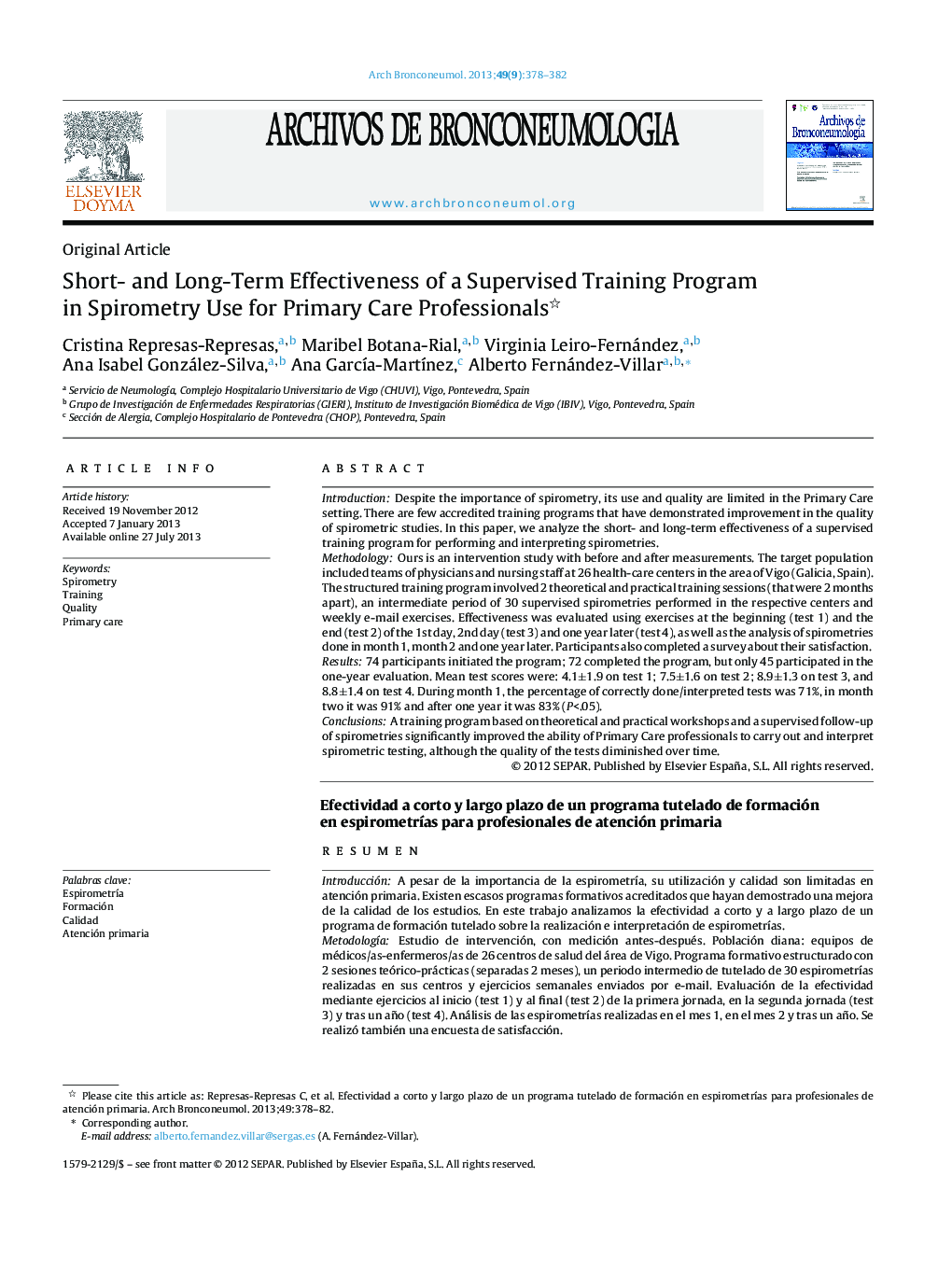| Article ID | Journal | Published Year | Pages | File Type |
|---|---|---|---|---|
| 4205656 | Archivos de Bronconeumología (English Edition) | 2013 | 5 Pages |
IntroductionDespite the importance of spirometry, its use and quality are limited in the Primary Care setting. There are few accredited training programs that have demonstrated improvement in the quality of spirometric studies. In this paper, we analyze the short- and long-term effectiveness of a supervised training program for performing and interpreting spirometries.MethodologyOurs is an intervention study with before and after measurements. The target population included teams of physicians and nursing staff at 26 health-care centers in the area of Vigo (Galicia, Spain). The structured training program involved 2 theoretical and practical training sessions (that were 2 months apart), an intermediate period of 30 supervised spirometries performed in the respective centers and weekly e-mail exercises. Effectiveness was evaluated using exercises at the beginning (test 1) and the end (test 2) of the 1st day, 2nd day (test 3) and one year later (test 4), as well as the analysis of spirometries done in month 1, month 2 and one year later. Participants also completed a survey about their satisfaction.Results74 participants initiated the program; 72 completed the program, but only 45 participated in the one-year evaluation. Mean test scores were: 4.1±1.9 on test 1; 7.5±1.6 on test 2; 8.9±1.3 on test 3, and 8.8±1.4 on test 4. During month 1, the percentage of correctly done/interpreted tests was 71%, in month two it was 91% and after one year it was 83% (P<.05).ConclusionsA training program based on theoretical and practical workshops and a supervised follow-up of spirometries significantly improved the ability of Primary Care professionals to carry out and interpret spirometric testing, although the quality of the tests diminished over time.
ResumenIntroducciónA pesar de la importancia de la espirometría, su utilización y calidad son limitadas en atención primaria. Existen escasos programas formativos acreditados que hayan demostrado una mejora de la calidad de los estudios. En este trabajo analizamos la efectividad a corto y a largo plazo de un programa de formación tutelado sobre la realización e interpretación de espirometrías.MetodologíaEstudio de intervención, con medición antes-después. Población diana: equipos de médicos/as-enfermeros/as de 26 centros de salud del área de Vigo. Programa formativo estructurado con 2 sesiones teórico-prácticas (separadas 2 meses), un periodo intermedio de tutelado de 30 espirometrías realizadas en sus centros y ejercicios semanales enviados por e-mail. Evaluación de la efectividad mediante ejercicios al inicio (test 1) y al final (test 2) de la primera jornada, en la segunda jornada (test 3) y tras un año (test 4). Análisis de las espirometrías realizadas en el mes 1, en el mes 2 y tras un año. Se realizó también una encuesta de satisfacción.ResultadosIniciaron 74 alumnos, finalizaron 72, con solo 45 en la evaluación al año. La puntuación media en los test fue: 4,1 ± 1,9 en test 1; 7,5 ± 1,6 en test 2; 8,9 ± 1,3 en test 3, y 8,8 ± 1,4 en test 4. En el mes 1 el número de pruebas correctamente realizadas/interpretadas fue del 71%, del 91% en el mes 2 y, tras un año, del 83% (p < 0,05).ConclusionesUn programa formativo basado en talleres teórico-prácticos y el seguimiento tutelado de espirometrías hechas en sus centros mejora significativamente la capacidad de los profesionales de atención primaria para la realización e interpretación de esta prueba, aunque la calidad de los estudios decrece con el tiempo.
